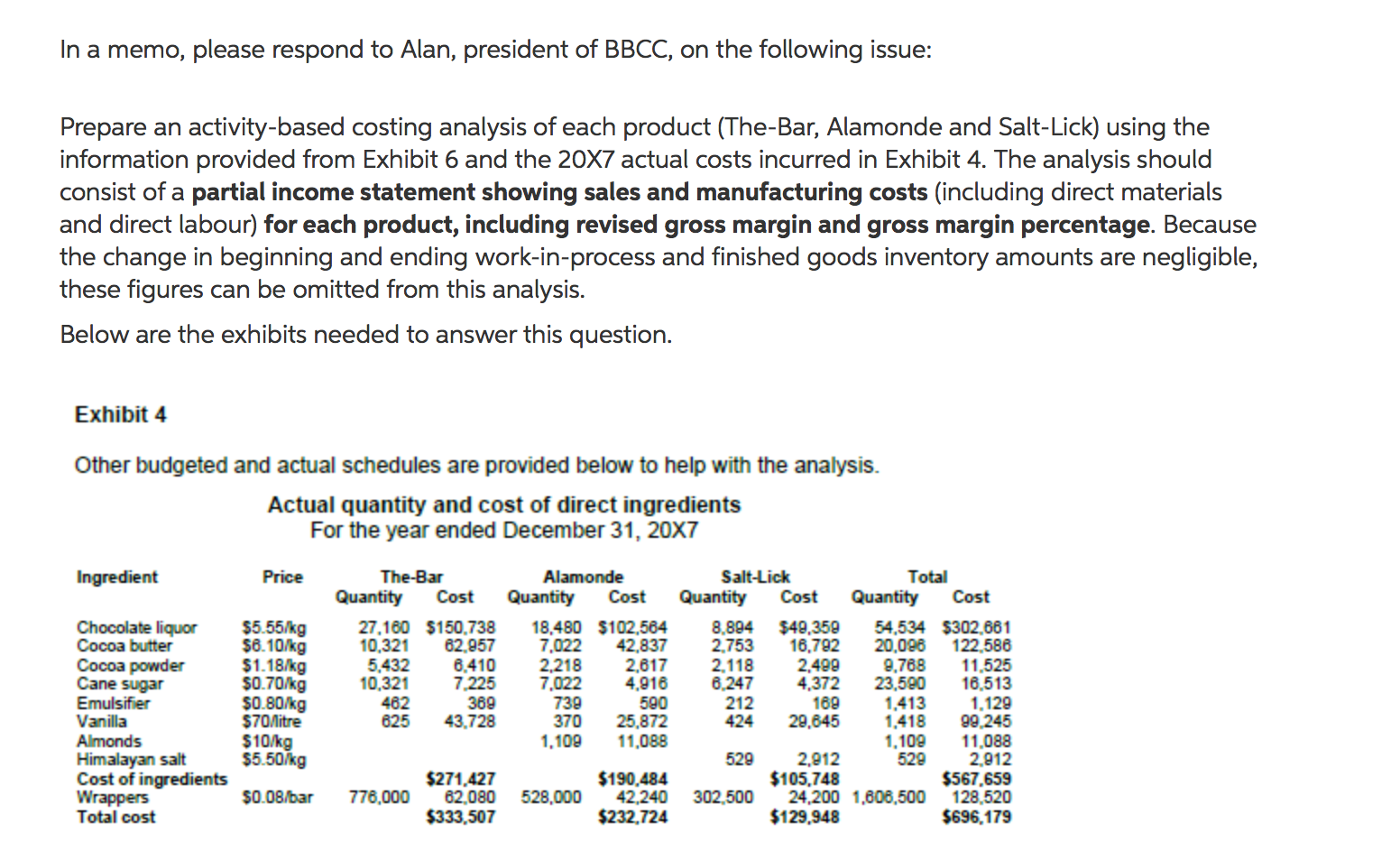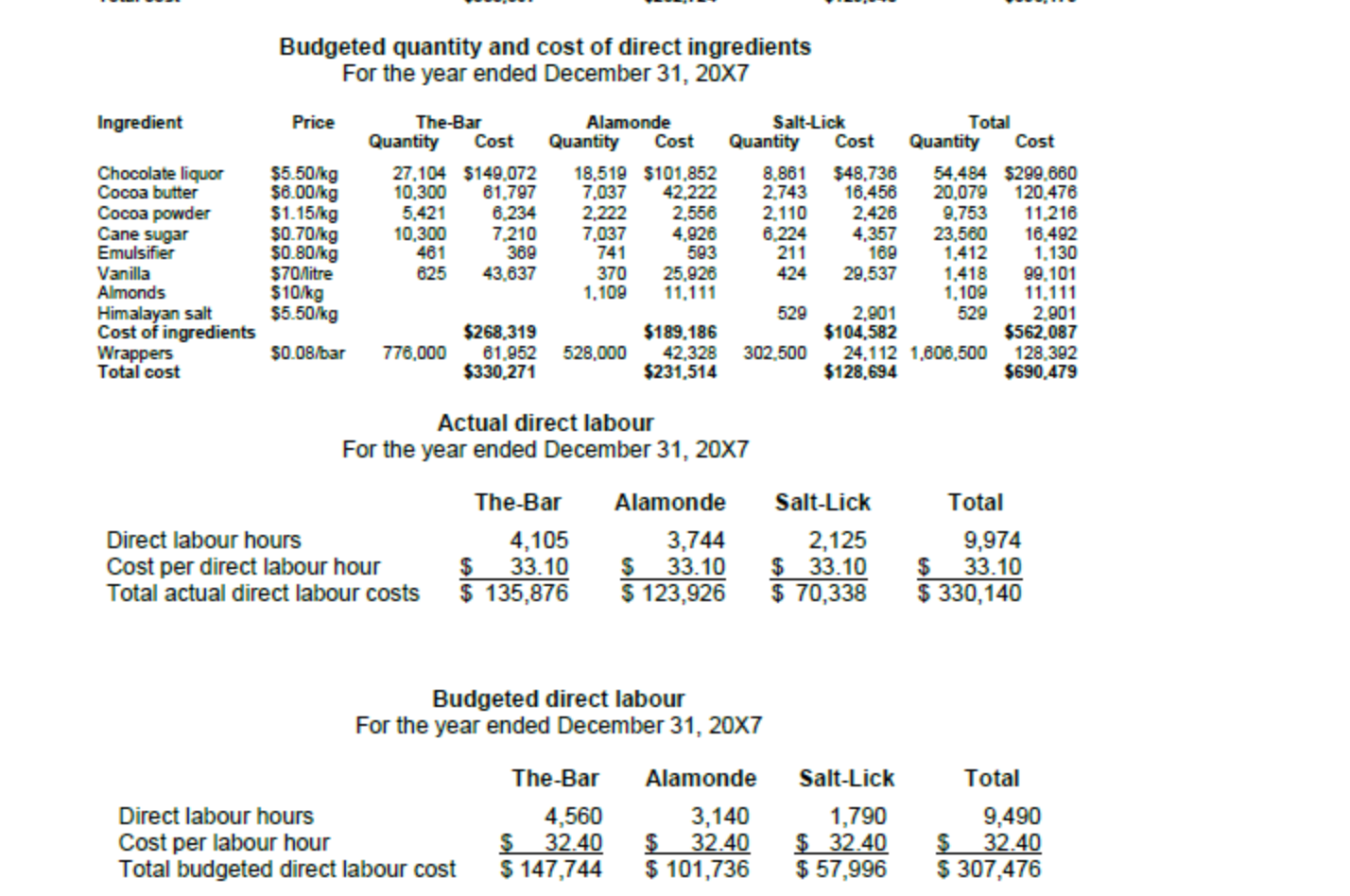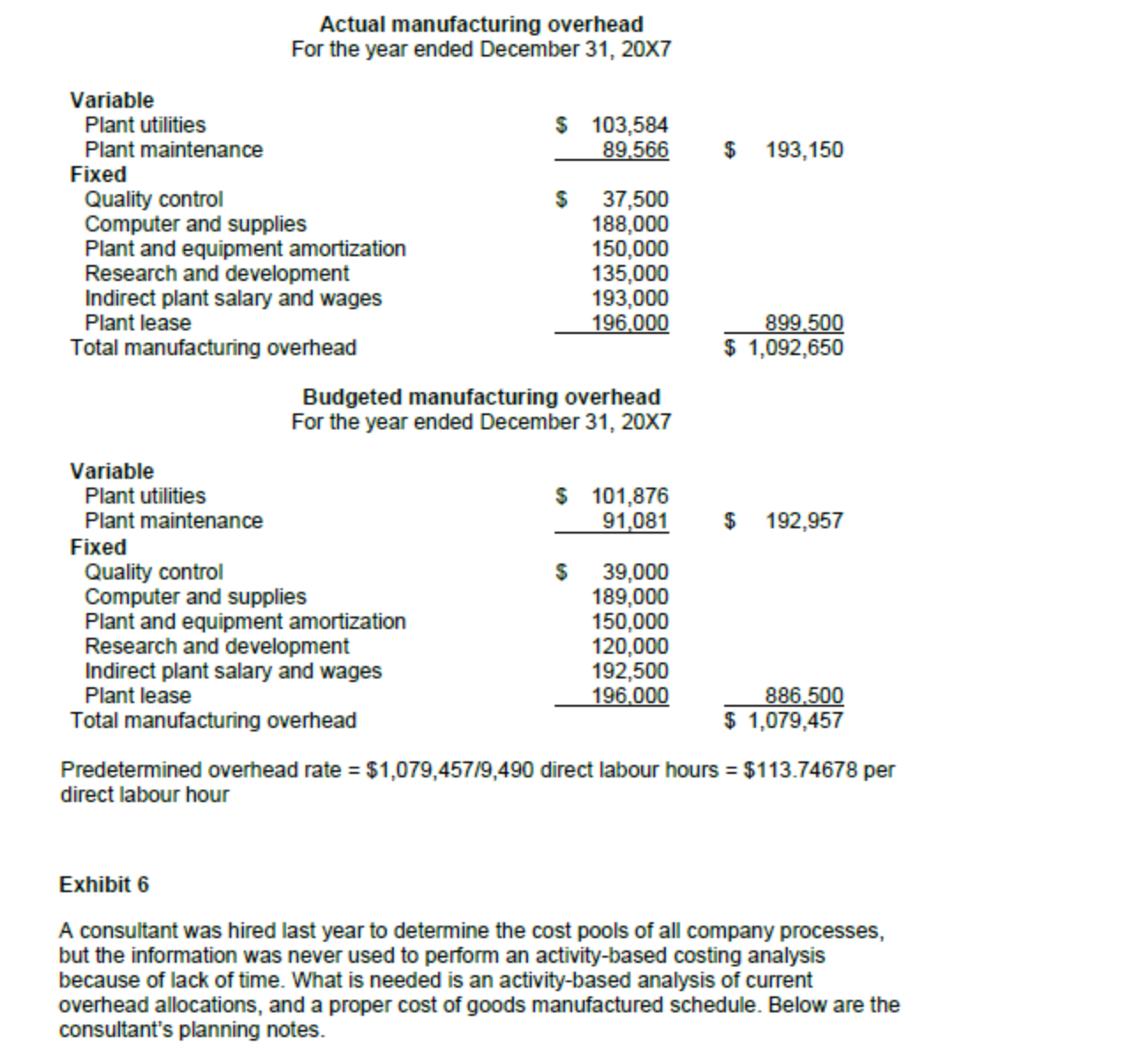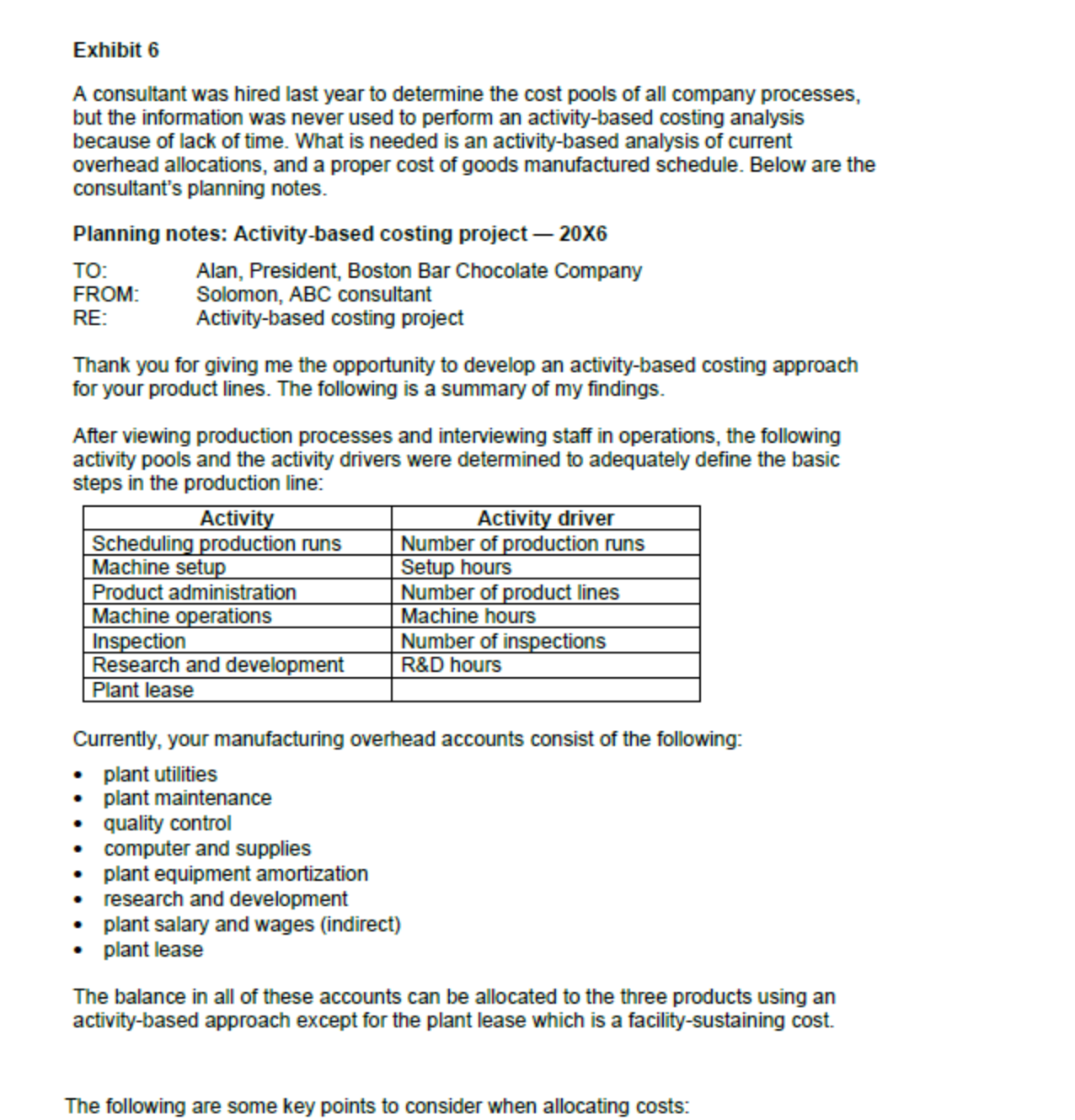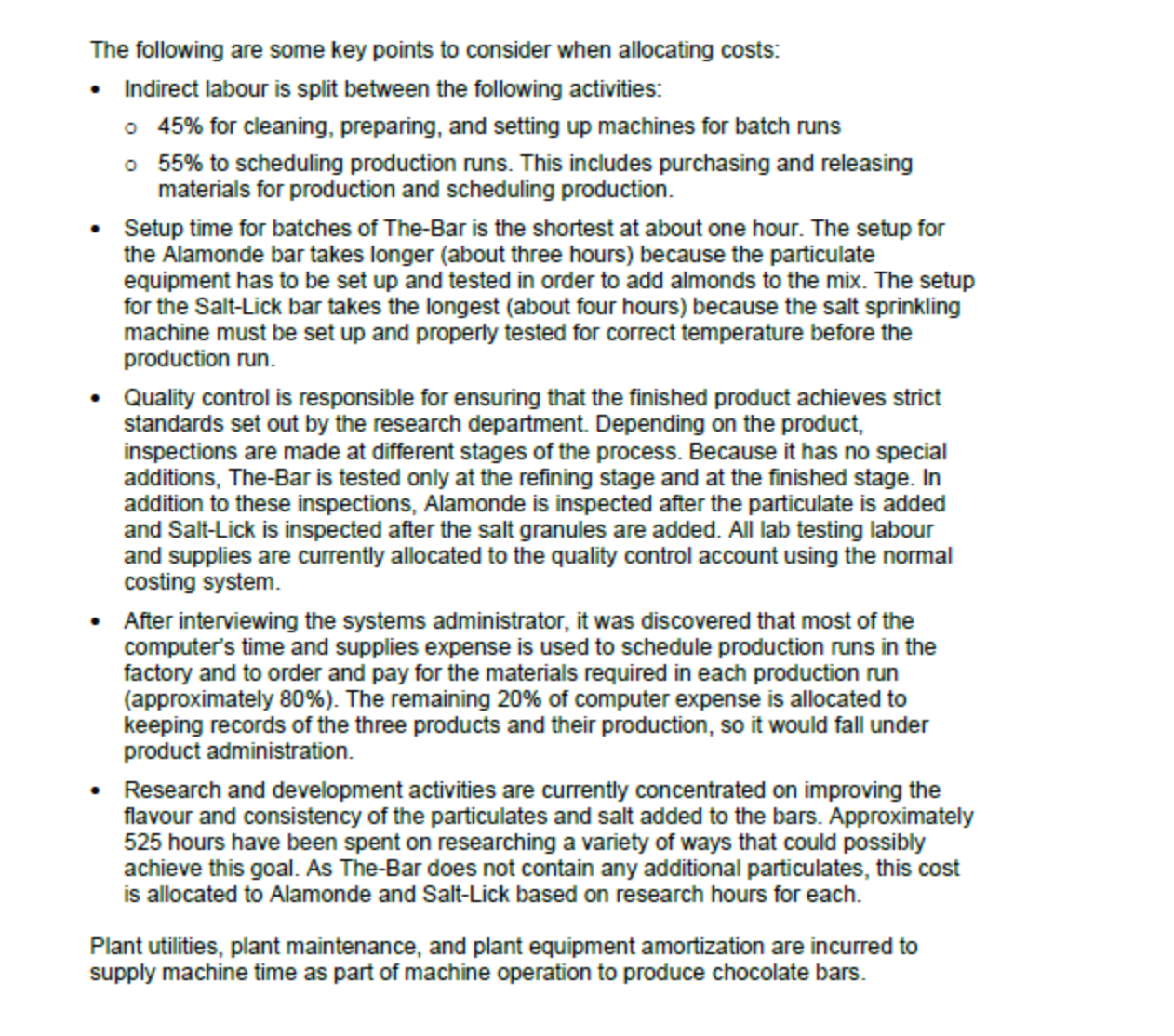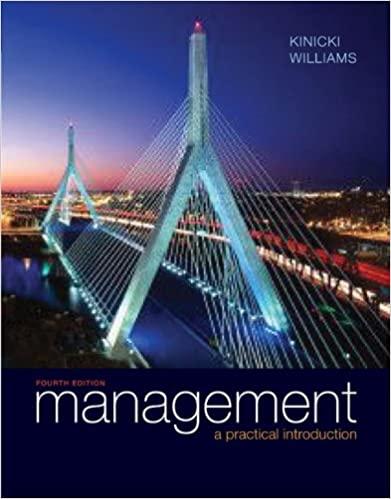please prepare the activity based costing analysis on the products
In a memo, please respond to Alan, president of BBCC, on the following issue: Prepare an activity-based costing analysis of each product (The-Bar, Alamonde and Salt-Lick) using the information provided from Exhibit 6 and the 20X7 actual costs incurred in Exhibit 4. The analysis should consist of a partial income statement showing sales and manufacturing costs (including direct materials and direct labour) for each product, including revised gross margin and gross margin percentage. Because the change in beginning and ending work-in-process and finished goods inventory amounts are negligible, these figures can be omitted from this analysis. Below are the exhibits needed to answer this question. Exhibit 4 Other budgeted and actual schedules are provided below to help with the analysis. Actual quantity and cost of direct ingredients For the year ended December 31, 20X7 Ingredient Price The-Bar Alamonde Salt-Lick Total Quantity Cost Quantity Cost Quantity Cost Quantity Cost Chocolate liquor $5.55/kg 27.160 $150,738 18,480 $102,584 8.894 $49,359 54.534 $302.661 Cocoa butter $6.10/kg 10,321 62,957 7.022 42,837 2.753 16,792 20,098 122,586 Cocoa powder $1.18/kg 5.432 6.410 2.218 2,817 2,118 2.499 9,768 11,525 Cane sugar $0.70/kg 10,321 7.225 7.022 4.916 6.247 4,372 23,580 16,513 Emulsifier $0.80/kg 462 369 738 590 212 169 1.129 Vanilla $70/litre 370 25,872 29.645 1.413 825 43,728 424 1.418 99.245 Almonds 1,109 11,088 1,109 11.088 Himalayan salt $10/kg $5.50/kg 529 2,912 529 2.912 Cost of ingredients $271.427 $190.484 $105,748 $567.659 Wrappers $0.08/bar 776,000 62.080 528,000 42.240 302,500 24,200 1,608,500 128,520 Total cost $333,507 $232,724 $129,948 $696,179Budgeted quantity and cost of direct ingredients For the year ended December 31, 20X7 Ingredient Price The-Bar Alamonde Salt-Lick Total Quantity Cost Quantity Cost Quantity Cost Quantity Cost Chocolate liquor $5.50/kg 27.104 $149,072 18,519 $101,852 8,861 $48,736 54.484 $299.660 Cocoa butter $6.00/kg 10,300 61,797 7.037 42,222 2.743 16,456 20,079 120,476 Cocoa powder $1.15/kg 5,421 6,234 2.222 2.558 2,110 2.426 9,753 11,216 Cane sugar $0.70/kg 10,300 7,210 7.037 4.926 6.224 4.357 23,560 16.492 Emulsifier $0.80/kg 461 369 741 593 211 169 1,412 1.130 Vanilla $70/litre 825 43,637 370 25,926 424 29,537 1,418 99.101 Almonds $10/kg 1.109 11,111 1,109 11,111 Himalayan salt $5.50/kg 529 2.901 529 2.901 Cost of ingredients $268,319 $189,186 $104,582 $562,087 Wrappers $0.08/bar 776,000 61,952 528,000 42.328 302,500 24,112 1,608,500 128.382 Total cost $330,271 $231,514 $128,694 $690,479 Actual direct labour For the year ended December 31, 20X7 The-Bar Alamonde Salt-Lick Total Direct labour hours 4,105 3,744 2,125 9,974 Cost per direct labour hour 33.10 33.10 33.10 33.10 Total actual direct labour costs $ 135,876 $ 123,926 $ $ 70,338 $ 330,140 Budgeted direct labour For the year ended December 31, 20X7 The-Bar Alamonde Salt-Lick Total Direct labour hours 4,560 3,140 1,790 9.490 Cost per labour hour S 32.40 32.40 $ 32.40 32.40 Total budgeted direct labour cost $ 147,744 $ 101,736 $ 57,996 $ 307,476Actual manufacturing overhead For the year ended December 31, 20X7 Variable Plant utilities $ 103,584 Plant maintenance 89.566 $ 193,150 Fixed Quality control $ 37,500 Computer and supplies 188,000 Plant and equipment amortization 150,000 Research and development 135,000 Indirect plant salary and wages 193,000 Plant lease 196.000 899.500 Total manufacturing overhead $ 1,092,650 Budgeted manufacturing overhead For the year ended December 31, 20X7 Variable Plant utilities $ 101,876 Plant maintenance 91,081 $ 192,957 Fixed Quality control 39,000 Computer and supplies 189,000 Plant and equipment amortization 150,000 Research and development 120,000 Indirect plant salary and wages 192,500 Plant lease 196.000 886.500 Total manufacturing overhead $ 1,079,457 Predetermined overhead rate = $1,079,457/9,490 direct labour hours = $113.74678 per direct labour hour Exhibit 6 A consultant was hired last year to determine the cost pools of all company processes, but the information was never used to perform an activity-based costing analysis because of lack of time. What is needed is an activity-based analysis of current overhead allocations, and a proper cost of goods manufactured schedule. Below are the consultant's planning notes.Exhibit 6 A consultant was hired last year to determine the cost pools of all company processes, but the information was never used to perform an activity-based costing analysis because of lack of time. What is needed is an activity-based analysis of current overhead allocations, and a proper cost of goods manufactured schedule. Below are the consultant's planning notes. Planning notes: Activity-based costing project - 20X6 TO: Alan, President, Boston Bar Chocolate Company FROM: Solomon, ABC consultant RE: Activity-based costing project Thank you for giving me the opportunity to develop an activity-based costing approach for your product lines. The following is a summary of my findings. After viewing production processes and interviewing staff in operations, the following activity pools and the activity drivers were determined to adequately define the basic steps in the production line: Activity Activity driver Scheduling production runs Number of production runs Machine setup Setup hours Product administration Number of product lines Machine operations Machine hours Inspection Number of inspections Research and development R&D hours Plant lease Currently, your manufacturing overhead accounts consist of the following: plant utilities plant maintenance quality control computer and supplies plant equipment amortization research and development plant salary and wages (indirect) plant lease The balance in all of these accounts can be allocated to the three products using an activity-based approach except for the plant lease which is a facility-sustaining cost. The following are some key points to consider when allocating costs:The following are some key points to consider when allocating costs: . Indirect labour is split between the following activities: o 45% for cleaning, preparing, and setting up machines for batch runs o 55% to scheduling production runs. This includes purchasing and releasing materials for production and scheduling production. . Setup time for batches of The-Bar is the shortest at about one hour. The setup for the Alamonde bar takes longer (about three hours) because the particulate equipment has to be set up and tested in order to add almonds to the mix. The setup for the Salt-Lick bar takes the longest (about four hours) because the salt sprinkling machine must be set up and properly tested for correct temperature before the production run. . Quality control is responsible for ensuring that the finished product achieves strict standards set out by the research department. Depending on the product, inspections are made at different stages of the process. Because it has no special additions, The-Bar is tested only at the refining stage and at the finished stage. In addition to these inspections, Alamonde is inspected after the particulate is added and Salt-Lick is inspected after the salt granules are added. All lab testing labour and supplies are currently allocated to the quality control account using the normal costing system. . After interviewing the systems administrator, it was discovered that most of the computer's time and supplies expense is used to schedule production runs in the factory and to order and pay for the materials required in each production run (approximately 80%). The remaining 20% of computer expense is allocated to keeping records of the three products and their production, so it would fall under product administration. Research and development activities are currently concentrated on improving the flavour and consistency of the particulates and salt added to the bars. Approximately 525 hours have been spent on researching a variety of ways that could possibly achieve this goal. As The-Bar does not contain any additional particulates, this cost is allocated to Alamonde and Salt-Lick based on research hours for each. Plant utilities, plant maintenance, and plant equipment amortization are incurred to supply machine time as part of machine operation to produce chocolate bars
